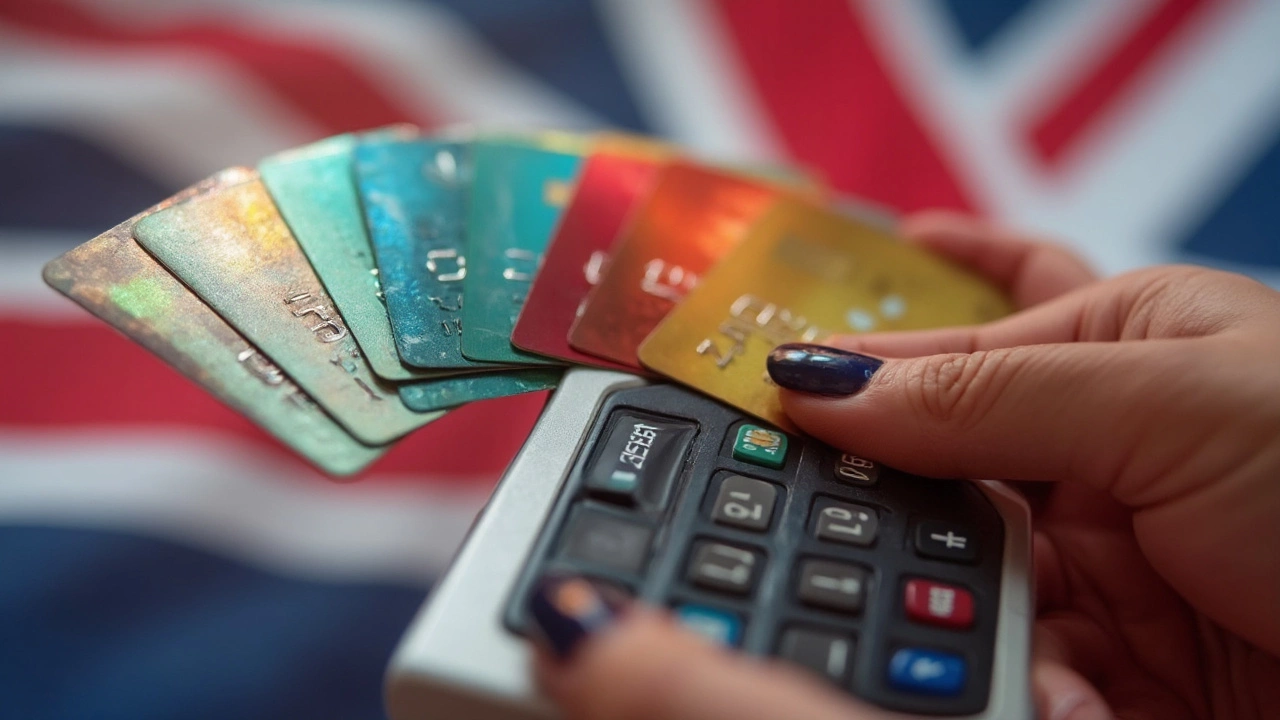Ever hear someone casually drop into a conversation, “I’ve got seven credit cards,” and suddenly the room goes quiet? It’s got the same energy as admitting you eat pineapple on pizza at an Italian restaurant. Some people will stare in awe, some in horror. But is having seven credit cards really overkill, or is it just more common than we think?
How Many Credit Cards Is Too Many? The Middle Ground
First off, let’s tackle the idea of 'too many.' Seven sounds like a big number, but it’s a lot more common than you might expect. According to a 2024 report by Finder NZ, the average Kiwi with at least one card actually holds 2.2 cards. Jump over to the United States and that average jumps to nearly four cards per person, based on recent Experian data from 2023. But, there are people—lots of them—walking around with six, seven, or even more plastic rectangles in their wallets with no drama at all. Still, numbers don’t tell the full story.
It really boils down to what you do with those cards. If they’re all maxed out, with late payments galore, then yeah, having seven is a problem. But if you use them wisely, pay balances off every month, and don’t let temptation get the best of you, those seven can actually work in your favour. For example, spreading spending across a few cards can help keep your credit utilization ratio low—a big plus for your credit score.
Why do people collect so many cards in the first place? Here’s the secret: every card brings something different to the table. One offers points on groceries, another gets you airline miles, a third gives you cash-back at petrol stations. Play the points game right and you might be living it up on rewards others only dream about—all while never paying a cent in interest.
But, and this is a massive but, the second those cards start gathering dust or you lose track of payment dates, you’re in trouble. Even a single missed payment can hit your credit score hard. Not to mention, juggling seven annual fees, seven sets of terms and conditions, and managing seven separate credit limits? It’s not for the faint-hearted.
So the real question isn’t if seven cards are too many—it’s if you can handle them. Do you thrive on organisation, check your accounts daily, track your rewards, and always pay on time? Or do you sometimes forget to pay the power bill and need reminders to put the bins out?

Credit Score Impact: Myths and Truths About Multiple Cards
The idea that more cards equals a worse credit score is one of the biggest myths out there. In fact, having several cards can help your score—if you play your cards right (pun intended). Credit scores, in New Zealand and most places, use three main things:
- Your payment history—do you pay on time?
- Your credit utilization ratio—how much credit you’re using compared to how much you’ve got available.
- Your average account age—how long you’ve had your cards open.
When you’ve got multiple cards and they’re all sitting at low balances because you pay them off fully—or better, you barely use them—you look super responsible to lenders. Your utilization ratio drops, and that’s a good thing. Say you have $2,000 on one card and a $2,500 limit—your ratio is 80%, which is pretty high. But with seven cards totalling $14,000 in limits, that same $2,000 is now only about 14% of your total credit. Instant score boost.
A 2023 TransUnion analysis showed that people with four to six bankcards (credit cards and major branded cards) typically had higher average credit scores than those with just one card—provided they managed their balances smartly and paid on time.
There’s a table of real world examples:
| Number of Cards | Average Credit Score (NZ, 2024) | Average Utilization (%) |
|---|---|---|
| 1 | 662 | 36% |
| 3 | 693 | 22% |
| 5 | 718 | 15% |
| 7 | 720 | 13% |
Still, it’s not all sunshine. Every time you apply for a new card, your credit file cops a hard inquiry. Do it too often and banks start to wonder if you’re in money troubles. And closing cards is a trap—especially your oldest one. If you shut the account you’ve had for ten years, your average account age drops. That can lower your score for months.
The real killer move? Only open cards you can use for the long haul, keep utilisation under 30% per card, pay balances off monthly, and never—never—miss a payment. Credit bureaus love that kind of loyalty.

Tips for Managing Multiple Credit Cards Like a Pro
If you’ve got seven cards (or thinking about it), you need a strategy. Nobody wants to be that person who thought they had it sorted... until annual fees stack up and forgotten charges spiral into debt. Here’s how to stay on top:
- Set up autopay cycles: Put every account on direct debit for at least the minimum. Just never miss a deadline—even accidentally.
- Use tech to keep tabs: PocketSmith and Mint are great for tracking your accounts in one dashboard. Your phone calendar’s little reminder feature is your friend.
- Review annual fees regularly: If you’re not getting enough value, call and ask for a retention offer—or close the card if you don’t need it (as long as it’s not your oldest card).
- Make a master cheat sheet: Keep a spreadsheet (locked and password-protected, obviously) with every card’s billing cycle, benefits, recurring charges, and credit limit. Update it monthly. You’ll thank yourself later.
- Rotate your spending: If a card is unused for a while, put one small recurring bill on it to keep it active and avoid closure by the bank. Most cards are closed automatically after 12-18 months of zero activity.
- Be mindful of temptation: Just because you CAN spend doesn’t mean you should. Treat your credit limits as safety nets—not shopping sprees.
- Check your credit file yearly: You can get a free report from Centrix or Illion in NZ. Spot any weird changes or errors before they land you in trouble.
- Points power: Got a card with rewards? Time the big purchases—like flights or insurance—with a generous signup or cashback offer to maximise your return.
- Travel tip: Don’t bring them all on trips. Pick one or two (ideally, one Visa and one MasterCard) just in case you lose your wallet. The rest stay somewhere safe at home.
Of course, there’s nothing magic about the number seven. Maybe you’ll thrive with two really good cards, or ten. Maybe you’re best with just a debit card. The trick is to match your habits with your setup—don’t stretch further than you can safely manage.
I’ve had as many as six cards at once, all for different perks: one with no foreign exchange fees for trips overseas, another for Airpoints flights to Wellington, a cashback card for groceries, one for tech store rewards, and a couple of fee-free options for emergencies and online shopping. It’s doable, but it takes discipline—miss a beat and it all unravels fast.
So, is seven credit cards too many? Depends on you. Some people crush it, juggling rewards and balance transfers with ninja-level skills. Others get in way over their heads. If you’re thinking of adding number seven, ask yourself: does it give me real benefit, can I keep track without stress, and am I paying everything off every month?
If the answer’s yes, go ahead. If you’re hesitating, maybe wait—and see how you go with what you’ve already got. Your future self, and your wallet, might just thank you for taking it slow.

